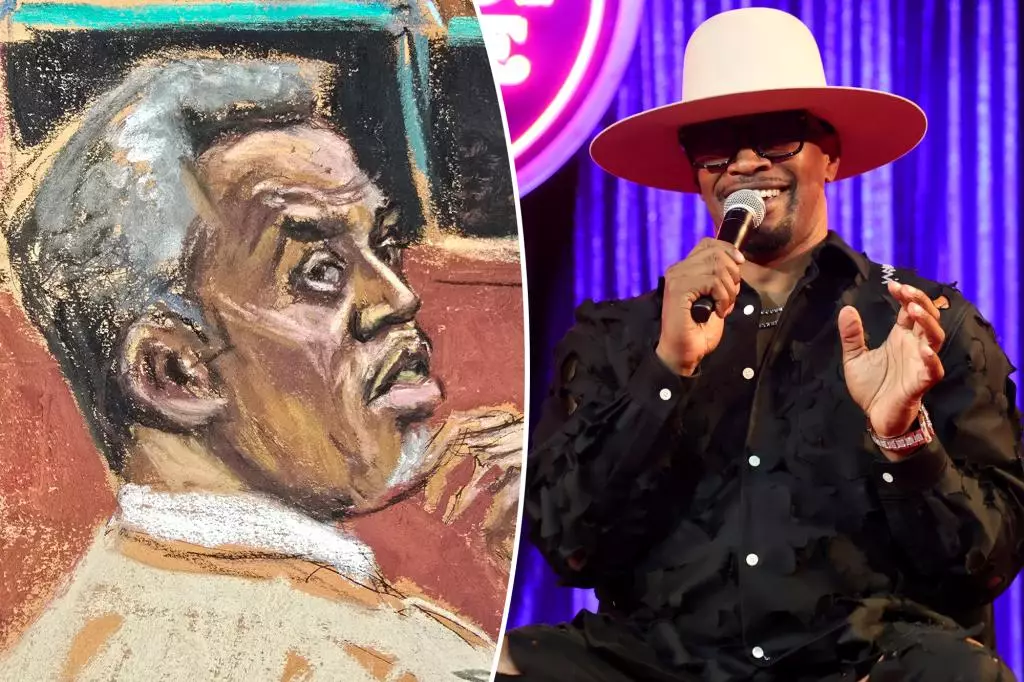In the world of comedy, nothing is sacred. The stage serves as a podium for artists to dissect societal narratives that often fly under the radar. Recently, Jamie Foxx took this mission to heart as he used his platform at The Comedy Store in West Hollywood to delve into the controversy surrounding Sean “Diddy” Combs. With razor-sharp wit, he illuminated Diddy’s ongoing sex-trafficking trial, exposing the disillusionment surrounding a figure once regarded almost mythologically in the realm of hip-hop.
Foxx’s humorous roast—though comedic in tone—pierced deeper truths about celebrity culture and accountability. The candid nature of his remarks makes one ponder the disparity between the myths created around celebrity figures and the harsh realities of their actions. He didn’t shy away from addressing Combs’ alleged sordid behaviors, saying, “That Diddy s—t crazy, huh?” The blend of humor and serious discourse is what makes Foxx’s approach noteworthy.
The Complexity of Hero Worship
Foxx’s comments resonate particularly with the Black community, who have often been told to idolize figures like Diddy. The rapper’s legacy seemed almost indomitable, representing black excellence within the entertainment industry. However, as Foxx pointed out, these revelations reframe that narrative entirely. “For the Black people in here, you know how that hurts us,” he lamented, highlighting the emotional stakes tied to societal icons.
The juxtaposition of Diddy’s past as a cultural hero against his current legal troubles raises questions about how we, as a society, choose our heroes. Can we separate the individual’s legacy from their misdeeds? Foxx’s commentary suggests that the community is left to grapple with the implications of these allegations, forcing a reckoning that many may find uncomfortable. It’s a stigma that amplifies the already deep-seated distrust in public figures, a betrayal that goes beyond mere entertainment.
From “Take That” to “Take This”
One of the most striking elements of Foxx’s roast was his clever manipulation of Diddy’s infamous catchphrase, “Take that, take that.” Foxx cleverly reframed it, asking, “‘Cause I don’t want any of that.” This vocal twist transforms Diddy’s once Playful mantra into something sinister, effectively encapsulating the disconnect between public persona and private actions. The transformation of a light-hearted phrase into an echo of abhorrence serves not just as comedic relief but as a profound critique on accountability and transparency.
Foxx’s humor exhibits how language can be both a tool for empowerment and a weapon for critical examination. This duality challenges audiences to scrutinize the messages we consume and champion while holding those who tell them accountable for their actions. The stark realization that your past heroes might have been engaging in deeply troubling behavior demands an examination of the narratives we allow to thrive unchecked.
The Broader Implications of Celebrity Justice
Currently facing serious charges such as racketeering conspiracy and sex trafficking, Combs’ legal woes reflect a growing concern about the consequences of unchecked power in celebrity culture. Foxx’s mockery is not only directed at Diddy but is, in essence, a broader commentary on how the justice system treats those entangled in fame. There is a palpable frustration that emerges, as Foxx indirectly questions why celebrities often evade accountability for their actions longer than the average citizen might.
The stakes here extend far beyond individual behavior; they usher in a larger conversation about how society perceives celebrity privilege—especially within racial contexts. Outsiders may see public figures as larger-than-life, but those within the community often grapple with the emotional ramifications of such idolization when revelations such as these come to light.
In the end, Jamie Foxx’s performance at The Comedy Store serves as a cultural touchstone, a necessary critique wrapped in humor that pushes audiences to rethink whom they elevate and what those platforms truly represent. Balancing comedy with critical discourse, Foxx invites all to reflect on the narratives we consume and the profound implications tied to the lifestyles of those we once revered.

